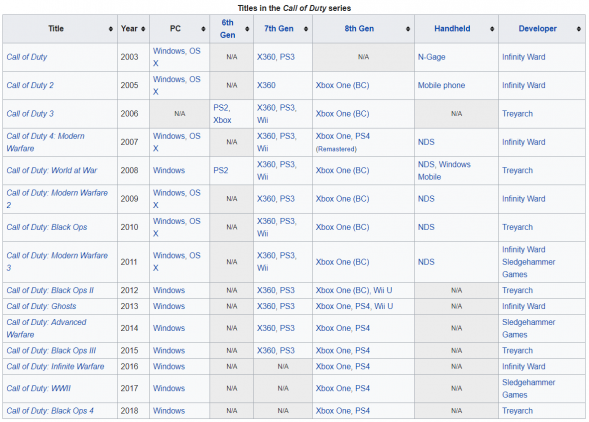The Call of Duty franchise has had its fair share of ups and downs throughout the past 17 years, but it seems the series may have reached its tipping point. The franchise has time and time again proved its resiliency in a constantly shifting video game industry, but some drastic changes will need to be made if Call of Duty will continue to be successful year after year.
Recent development news has prompted a discussion into Call of Duty’s future across the video game industry. Since 2005, each Call of Duty has been released annually but spread across two/three opposing development cycles.
According to a report by Kotaku, it appears that development on the 2020 Call of Duty is in jeopardy. The 2020 Call of Duty is consolidating the majority of its development back under Treyarch, rather than being co-developed by Sledgehammer Games and Raven Software.
While it appears this doesn’t affect Infinity Ward’s 2019 Call of Duty title, which is also reported to be a reboot of the Modern Warfare sub-series, this is the first major departure from its standard three-year development cycle they allocated for each developer’s respective entry in the series. Activision’s development strategy for Call of Duty has remained largely consistent since 2005, so this marks the first time in a decade that Activision would significantly change their development structure of the franchise.
It’s hard not to see this as a reactionary response; regardless of Activision’s confidence in Black Ops 4, the company’s stock dropped several points, and has been trading down along with powerhouses like EA and Take Two Interactive, despite a strong opening and a separate development studio. At this point it appears Call of Duty is at a crossroads, with the franchise slowly fading from its position as cultural phenomenon to irrelevancy.
There is still hope for Call of Duty to rise above those predicting the franchise’s downfall, but some drastic changes may be necessary to adapt to the current climate of games.
One of the first thoughts that might come to mind is Activision, Treyarch, Infinity Ward and others taking time off from their annual release schedule to reboot the franchise. And if that additional report is true, that may be exactly what they are planning on doing with 2019’s Call of Duty entry.
Whenever there’s supposedly a “dying” franchise in the video game industry, talk of a reboot pops up all the time. And rightfully so, plenty of franchise reboots have seen plenty of success. Prime examples of positive reboots include 2018’s God of War and 2013’s Tomb Raider, each of which revolutionized their games in different ways. There are also bad examples as well, like 2017’s Star Wars: Battlefront or 2013’s Aliens: Colonial Marines, both of which failed to properly reimagine their respective franchises.
Reboots certainly have potential, but it’s hard to have faith in Activision and their respective developers, who have been iterating on a similar game structure since 2007. But it certainly could happen, considering the leap between Call of Duty 3 to Call of Duty 4: Modern Warfare was such a substantial overhaul both graphics and gameplay-wise. A jump like that in 2019 would require manpower and substantial development time, which would shake up their current annual release schedule if their plans for 2019 and 2020 ring true.
Another one of the most popular suggestions is turning the franchise to a free-to-play and/or seasonal model like games such as Fortnite or Rainbow Six Siege. Activision has consistently proved its stubbornness and its preference of selling games at $60 as a premium product once a year, rather than developing games cheaper/free-to-play designed to promote longevity.
It would be impossible to be profitable for a franchise on an annualized free-to-play model, as logistically it would be unsustainable.
Micro transactions and loot would have to be transferable/compatible with each new entry, otherwise consumers would be discouraged from spending any money altogether knowing they’d have to reset and do it again every year. And considering their track record, it’s impossible to predict Call of Duty ditching its current annual release structure in favor of a games-as-a-service model.
Unless Activision fundamentally changes the way they design Call of Duty’s development and business model, it’s very unlikely that mainline Call of Duty would ever take that road of development. Not to mention none of their current Call of Duty developers have any experience with long-term free-to-play game design.
What they should focus on is innovating the series beyond minor face-lifts and incremental changes. It’s time for Call of Duty to take everything that’s made the series great and create a new experience. New game modes and some new mechanics are great, but if it doesn’t fundamentally change the way the game is played, it’s not going to last.
Options aplenty, Call of Duty could seriously change its framework to succeed. They could change the dynamic to a condensed, realistic team game similar to Rainbow Six: Siege with their own twist. Perhaps they could change their multiplayer framework entirely to be more objective-based similar to Battlefield’s operations/conquest structure but on a smaller scale. They could further emphasize their “Blackout” mode from Black Ops 4 into a truly unique battle royale experience.
They could even completely change their gameplay framework beyond what we’ve already seen/expected from the franchise if they’ve dedicated the time to crafting a succinct and amazing new experience.
The bottom-line is Call of Duty needs to do something drastic if they want to continue being an industry-leading franchise. They’ve iterated upon so many games for several generations of players for almost two decades. The time is now for them to try something new, or Call of Duty may not be relevant for much longer.







